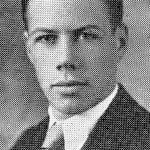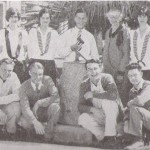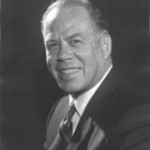 U.S. Senator Thomas Henry Kuchel was born Aug. 15, 1910 in Anaheim to Henry and Letitia Kuchel. While growing up, Kuchel often aided his father who, for 48 years, was publisher of the Anaheim Gazette, the city’s newspaper of record.
U.S. Senator Thomas Henry Kuchel was born Aug. 15, 1910 in Anaheim to Henry and Letitia Kuchel. While growing up, Kuchel often aided his father who, for 48 years, was publisher of the Anaheim Gazette, the city’s newspaper of record.
From an early age, Thomas grew to have an interest in the political process by regularly reading the Congressional Quarterly out loud to his father.
Another defining event in the life of Thomas Kuchel came during his teenage years. In 1924, the Ku Klux Klan began to aggressively recruit members in Southern California. At one point, the Klan claimed to have a membership of 1,400 in their Anaheim chapter.
The Ku Klux Klan had designs on gaining power and influence by electing members to public office, including three members of the Anaheim City Council. Despite considerable intimidation, the Kuchel family and the Anaheim Gazette took a brave stand against the forces of racism and bigotry. The Gazette published a list of known Klan members, sparking a recall election that ultimately ousted not only four city council members who supported the KKK, but also many members of the police department, who were reportedly members.
Thomas Kuchel advanced on to Anaheim High School, where he was active as student body president, as a yell leader and as a member of the debate team. Once, during a debate with a team of students from Whittier High School, Kuchel would challenge and ultimately defeat a young student by the name of Richard Nixon.
After graduating from Anaheim High in 1928, Kuchel attended the University of Southern California. He received his bachelor’s degree in 1932, then moved on to USC Law School, where he graduated three years later.
At the age of 26, Kuchel sought his first elective office, winning a seat in the California State Assembly. He represented the 75th District, covering most of Orange County for two terms before he was elected to the California State Senate in 1940. At the age of 30, he became the youngest man ever to be elected chairman of the Republican State Central Committee.
Though he would serve as a State Senator from 1941 to 1945, he would answer another call to duty as the United States entered World War II. Kuchel was commissioned as a lieutenant commander in the U.S. Naval Reserves.
In 1946, at the request of Governor Earl Warren, Kuchel accepted an appointment to serve as the California State Controller. He would serve as the state’s chief financial officer until 1953, when Warren appointed him to take newly-elected Vice President Nixon’s Senate seat.
Kuchel was no caretaker in his new position, as he won a special election in 1954, then was elected to a full term in 1956. Following California’s strong progressive Republican tradition, Kuchel became a leading voice in the Senate, and in 1958 was selected as the Senate minority whip. Charged with shepherding fellow Republicans on legislative votes, Kuchel was at the center of many of the major issues facing the United States during the 1960s.
Though he had a reputation for being fiscally conservative, and was a strong supporter of American involvement in Vietnam, Kuchel’s career in the U.S. Senate was defined by his instrumental part in passing the 1964 Civil Rights Act.
With Southern Democrats still beholden to extremism and committed to blocking much-needed reforms, President Lyndon Johnson knew that he would need Republican support to break the filibuster. Kuchel and Senate Minority Leader Everett Dirksen worked closely with Johnson, and together with his Democratic counterpart Hubert Humphrey, and were able to craft a compromise bill that secured the necessary votes on the Senate floor to overcome the Southern Democrat opposition and break the Dixiecrat filibuster, taking America one giant step forward towards becoming “A More Perfect Union.”
Kuchel also was heavily involved in passing Medicare and was a supporter of the Atomic Test Ban Treaty, the Labor Management and Disclosure Act, and the Interstate Highway Act.
Of Medicare, Kuchel remarked: If it weren’t for Medicare today, there would be tens of thousands of Americans living in the poorhouse, with no care. It was a baker’s dozen of progressive Republicans in the Senate who agreed we would vote for Medicare. . . . I was their spokesman, and we provided the necessary margin for passage.”
Additionally, Senator Kuchel was a strong voice for conservation. As the ranking Republican on the Senate’s Interior Committee, Kuchel sponsored numerous laws that created and expanded reservoirs, wildlife refuges, wilderness areas, and national parks. Chief among his environmental accomplishments was the creation of Redwood National Park, which he introduced in a bill in 1962. Today, a visitor’s center at Redwood National Park is named in his honor.
Though Kuchel disdained fundraising and the political game, his independence and dedication to the State of California was evident as he was twice elected to terms in his own right. In 1962, a year in which Nixon was defeated in a run for governor by 300,000 votes, Kuchel was re-elected by a margin of more than 700,000 votes. He is also the last California Senator to win all 58 counties in the state.
Kuchel’s accomplished career in the U.S. Senate would come to an abrupt end in 1968. Although he was widely expected to win in the general election, Kuchel received a well-financed challenger in the GOP primary. Backed by conservative Republican adversaries, educator Max Rafferty was able to defeat Kuchel by a margin of 69,000 votes out of 2.2 million votes cast. This happened on the night of June 5, 1968, remembered for a much greater tragedy in the assassination of Senator Robert Kennedy in Los Angeles. Rafferty was later defeated soundly by Democrat Alan Cranston in the 1968 general election.
As he left the Senate, Kuchel expressed pride in his record: “Some of the votes I have cast I know have been very costly to me politically,” he told the Senate in his formal farewell speech. “I think, however, if there is one measure of satisfaction in the life of a legislator, it comes at the time he tallies the votes which he believed in his own mind were right, just and appropriate, even if he knew that the balance of public opinion was against him, and, sometimes, violently against him. . . . “I think it is not only permissible but, indeed, vital that the Senate of the United States lead public opinion instead of following it. That is the difficult path but the only one to tread if our republic is to remain.’ “
Following his leaving the Senate, Kuchel would practice law in Los Angeles as a partner with Wyman, Bautzer, Kuchel & Silbert. He retired in 1981, and spent his remaining years enjoying life with his family. Kuchel passed away due to lung cancer in 1994. He was survived by his wife Betty, their daughter Karen Peterson Blanchi, and grandsons Jason and Peter Smith. 520 Vick Place, Beverly Hills.
Thomas Henry Kuchel led a remarkable life, and the impact of his leadership reverberates even to today. He strongly believed in the political philosophy of governing for the many, and many Americans are indebted to his example. It is an example which reflects the high standards of Anaheim High School, and we humbly induct Senator Kuchel into the Anaheim High School Hall of Fame.






